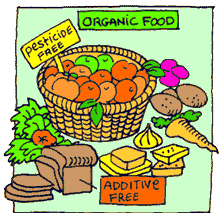I have to admit that I am a big fan of organic food. However, to make this blog unbiased I will also state the cons of going organic. I have done my research and indeed there is vast information on organic food. I have attempted to summarize this and will only write the most relevant information to provide the best understanding on organic food.
First of all, Organic food are farmed and produced in the traditional way. This means that the farming method used in producing organic food does not involve any form of synthetic chemical inputs such as pesticides, food additives, antibiotics, fertilizers and so on.
Furthermore, organic food does not contain genetically modified organisms, no use of irradiation, sewage, no use of other industrial solvents or other chemical inputs. Organic food is also only farmed in a land that have not had any chemical inputs for at least three years which mean the soil is 'clean' from chemicals.
Attaining a certificate which labels food 'organic' is heavily regulated. Many countries including the EU and US are bound to comply with the organic standards implemented by their respective governments and international organization. Therefore, the quality of organic food is strictly maintained.
The PROS of going Organic:
- Organic food simply taste better than the non organic food--if this is not enought to convince you then maybe the following benefits can..
- Organic food contains more nutrition since the farming method used does not contain any chemical inputs which prevents the soil from contributing minerals and vitamins to the crops. In addition, traces of chemicals in non organic crops and soil could also prove to be harmful not only in our body but the also the environment. Hence, without these chemical inputs such as pesticides, the crops are then able to benefit from growing in a 'chemical free' soil which enables the soil to pass on more nutrients to the crops.
- Organic food does not contain genetically modified ingredients. I am not a scientist and I will not claim to be an expert when it comes to GM crops (genetically modified crops) but I will assume that these kind of crops aren't natural. Basically, if GM crops is a human it can be compared to someone who has had a 'breast implant' or any other major type of cosmetic surgery. Another article I've read claimed that GM crops could also be compared to 'Frankenstein' who has undergone various experiments to stay alive. Indeed, some believe that producing GM crops is apparently 'messing with nature' and the idea of eating and putting this in our body sounds rather unpleasant.
- Organic food production is safer and healthier for the environment and animals since the farming method used protects the structure and the natural content of the soil without any type of pesticides, additives and so on. In addition, organic farming of animals are also far more humane-- ensuring that the animals are well kept in a clean farm and fed with organic food. Personally, I prefer to eat organic chicken than the caged ones since organic chicken tastes better. Also I can't get myself to eat chicken who have lived a miserable life and could potentially have skin diseases. For those who are brave, here is a sample video of cage hens farming http://www.youtube.com/watch?v=IdzQf95rpcU
- Organic food production is sustainable and protects wild life since the organic farming method used does not contain chemicals. These chemicals in the long run could potentially damage our wild life since some of the contents of the chemical inputs are apparently proven to be harmful and toxic to animals and the wild life. Also industrial farming often destroys natural habitats by cutting more trees leaving some animals displaced from their natural habitat.
I have not found any health disadvantages from consuming Organic food but in terms of productivity, cultivation and costs then there are quite a few cons.
CONS of going Organic
- Indeed, it is more costly not only to buy in super markets but it is also costly for the farmers to produce. Apparently, organic crops such as the fruits must be harvested ripe and sold quickly which means the organic food could only stay in the shelves in a short period of time. Whereas, the non organic crops are harvested early and allowed to ripen in the distribution process leaving enough shelves time and for all the non organic food to be sold which means less food waste.
- There were also claims that organic production slows down the overall food production since organic farming uses the method of crop rotation. This means that the soil is given enough time to replenish itself from being able to grow crops again and pass on nutrients to these crops. Whereas, non organic food production uses chemicals to speed up the process of harvesting by chemically recharging the soil. Hence, this apparently made mass production possible and allows farmers to meet high demands. Some argue that this type of farming method could feed a growing country or a growing world.
Nonetheless, I believe that the PROS outweigh the CONS. In addition, the disadvantages of going organic are not disadvantages to our health but disadvantages on mass production. Apparently, the non organic farming methods could feed the growing and hungry world....YEA RRIGHTT!
 |
| Starving child and mother in Africa |
 |
| Increasing Obesity in Western Countries |
Aaahh i'll leave it up to the readers to make their own judgement. Until then, good luck!
Show some love by liking my Facebook page!











Comments